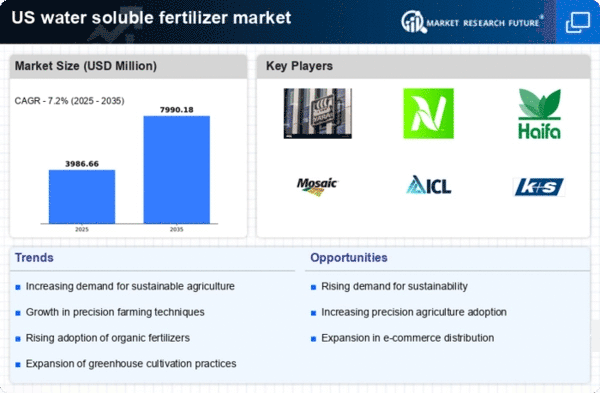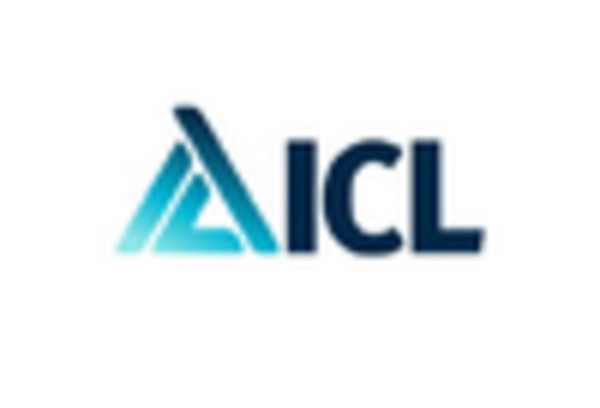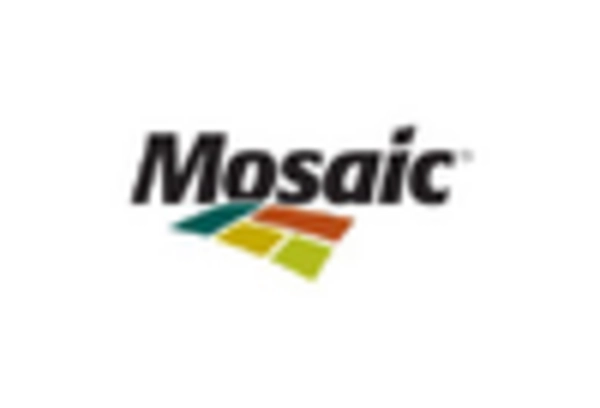Growth of Organic Farming Practices
The rise of organic farming practices is contributing to the expansion of the water soluble-fertilizer market. As consumers increasingly seek organic produce, farmers are turning to water soluble fertilizers that meet organic certification standards. These fertilizers provide essential nutrients while adhering to organic farming regulations. The organic food market in the US has been growing at a rate of approximately 8% annually, creating a substantial demand for compatible fertilizers. This trend suggests that the water soluble-fertilizer market will continue to evolve, with a focus on developing organic formulations that cater to this growing segment. The shift towards organic farming is likely to reshape the landscape of the water soluble-fertilizer market.
Rising Demand for High-Quality Crops
The increasing consumer preference for high-quality agricultural products is driving the water soluble-fertilizer market. Farmers are increasingly adopting water soluble fertilizers to enhance crop yield and quality. This trend is particularly evident in the production of fruits and vegetables, where quality is paramount. According to recent data, the market for water soluble fertilizers in the US is projected to grow at a CAGR of approximately 6.5% from 2025 to 2030. This growth is attributed to the need for efficient nutrient delivery systems that can meet the demands of modern agriculture. As consumers become more health-conscious, the demand for high-quality crops is likely to continue, further propelling the water soluble-fertilizer market.
Government Support for Sustainable Agriculture
Government initiatives aimed at promoting sustainable agricultural practices are influencing the water soluble-fertilizer market. Various federal and state programs provide financial incentives for farmers to adopt environmentally friendly practices, including the use of water soluble fertilizers. These fertilizers are often more efficient in nutrient delivery, reducing runoff and environmental impact. As a result, the market is likely to see increased adoption among farmers seeking to comply with regulatory standards. Recent reports suggest that government funding for sustainable agriculture could reach $500 million annually, further supporting the growth of the water soluble-fertilizer market. This alignment with sustainability goals is expected to drive market expansion.
Increased Focus on Efficient Resource Management
The growing emphasis on efficient resource management in agriculture is shaping the water soluble-fertilizer market. Farmers are increasingly aware of the need to optimize resource use, particularly water and nutrients, to enhance productivity and sustainability. Water soluble fertilizers offer a solution by providing nutrients in a readily available form, reducing the risk of nutrient leaching and wastage. This focus on efficiency is reflected in the rising adoption of water soluble fertilizers, which are projected to account for over 30% of the total fertilizer market by 2030. As resource management becomes a priority, the water soluble-fertilizer market is likely to experience robust growth, driven by the need for sustainable agricultural practices.
Advancements in Fertilizer Application Techniques
Innovations in fertilizer application techniques are significantly impacting the water soluble-fertilizer market. Precision agriculture, which utilizes technology to optimize field-level management, is gaining traction among farmers. This approach allows for the precise application of water soluble fertilizers, ensuring that crops receive the right nutrients at the right time. The adoption of drones and automated systems for fertilizer application is on the rise, enhancing efficiency and reducing waste. As a result, the water soluble-fertilizer market is expected to benefit from these advancements, with an estimated increase in market value of around $1.5 billion by 2030. This trend indicates a shift towards more sustainable and efficient farming practices.
















